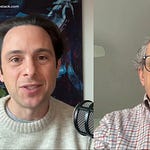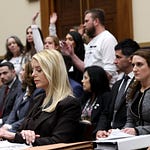“The [Appointments] Clause is a bulwark against one branch aggrandizing its power at the expense of another branch, but it is more: it ‘preserves another aspect of the Constitution’s structural integrity by preventing the diffusion of the appointment power.’”
— Justice William Rehnquist, Ryder v. United States (1995)
During most federal court oral arguments on a motion to dismiss, the headline most reporters look for is a prediction about where the judge is leaning. In a criminal case, is it looking better for the government or the defense?
By that metric, the headline is easy: “Judge Deeply Skeptical Trump-Installed Prosecutor Was Validly Appointed.” Perhaps the lead would weigh the odds of the dismissal of two of the country’s most closely watched cases: U.S. v. James Comey and U.S. v. Letitia James. To mitigate the risk of an inaccurate prediction, an experienced reporter would hedge (accurately) that Senior U.S. District Judge Cameron Currie sharply questioned the futures of both cases.
Even with the possible dismissal of these historic cases on the line, a factual revelation overshadowed the gambling odds today.
Judge Currie revealed that there’s a more than two-hour gap in Comey’s grand jury record. There was no court reporter present between 4:28 p.m. Eastern Time until the return of the indictment at around 6:47 p.m. ET.
Mind the gap
That means there is no record of what happened in those nearly two-and-half hours when a razor-thin majority of grand jurors decided to return a two-count indictment—and rejected what would have become the top charge.
As a legal matter, that could doom the government’s case against Comey entirely.
Both Comey and James argue that Trump’s former lawyer turned first time prosecutor Lindsey Halligan was illegally appointed because she is the second interim U.S. Attorney in her district to be installed in her role without Senate confirmation. Trump pressured out her predecessor Erik Siebert, a conservative, because Siebert did not believe the cases against Comey and James were warranted. Before becoming a Supreme Court justice, Samuel Alito wrote a Justice Department Office of Legal Counsel opinion finding that two consecutive interim U.S. Attorney appointments aren’t permissible.
Three Trump-installed acting U.S. Attorneys — Alina Habba, Bill Essayli, and Sigal Chattah — have been disqualified from their positions after similar challenges, despite entering their offices through a different mechanism. Halligan would be the fourth consecutive defeat for Trump-appointed prosecutors.
On Oct. 31, Attorney General Pam Bondi tried to shore up Halligan’s bona fides by issuing an order claiming to retroactively declare Halligan a “special attorney.” She claimed to make that decision “based on [her] review of the grand jury proceedings” in both cases.
Currie pointed out that it “became obvious to me that the Attorney General could not have reviewed” the full grand jury materials once she spotted the gap.
“A fundamental defect”
Throughout the proceedings, Comey sat in the courtroom next to attorneys Abbe Lowell and Ephraim McDowell. Halligan was flanked by her out-of-district assistant prosecutors Henry Whitaker and Nathaniel Lemons. Neither Comey nor Halligan said a word during the proceedings.
Whitaker tried to downplay the controversy as “at best, a paperwork error.”
But Lowell noted: “This is not a mere technicality because it goes to whether a person was competent at the time they sat in this case.”
McDowell, representing Comey, framed defense arguments with this introduction.
“This prosecution should be dismissed with prejudice because of a fundamental defect,” he said, referring to the failure to pass constitutional and statutory muster. “Since the Founding of our nation, United States Attorneys have been confirmed by the Senate.”
If not reversed on appeal, a dismissal with prejudice would stop the government from pursuing the cases again. To prevail, the defense would need to prove that Halligan’s appointment wasn’t “harmless error,” which depends on an analysis of whether the case would exist “but-for” the identified flaw.
Lowell called that test an easy one.
“If this is not a good example of the ‘but-for’ under harmless error, I couldn’t think of one myself,” he said.
Halligan rushed into the grand jury room before the statute of limitations for Comey’s indictment expired.
Judge Currie promised a ruling by Thanksgiving.
Watch the full video at the top of the story, which aired directly after today’s proceedings.












